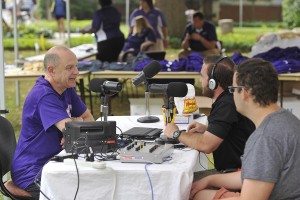Western Carolina University will create a new non-commercial radio station that could potentially reach 5 counties in Western North Carolina, after waiting nearly six years for the decision from the Federal Communications Commission (FCC).
WCU and the Department of Communication will run the new station on the 95.3 FM frequency.
The current station, WWCU 90.5 FM, reaches approximately 90,000 residents. The new station is estimated to increase the coverage area by 70 percent and will reach approximately 153,000 residents. The station will potentially reach as far as Franklin, Cherokee, Waynesville and Bryson City.
“[I’m most excited about] the opportunities that it will provide to students here at Western, immediately, from the stand point that there will be students involved in experiential learning opportunities as we build the station,” Don Connelly, head of WCU’s Department of Communication, said.
The benefits of the new station, said Connelly, are expanding the ability to provide emergency communication, broadcasting the Catamount Sports Network to a wider area and allowing their unique and various music formats to be disseminated to a larger group of people.
“It means a bigger audience, more possible employers listening, more pressure to perform well,” Calvin Inman, a student volunteer disc jockey at WWCU, said.
The 95.3 FM frequency, said Connelly, is currently being used by WCQS, the Asheville-based National Public Radio member station, as a translator to broadcast its signal in Cherokee, Hazelwood and Waynesville. The university is in talks to lease the air space on 90.5 FM to WCQS, but the university will retain ownership of the frequency.
The university filed an application to the FCC for the new frequency in February 2010, along with four other organizations. It wasn’t until May 8, 2015, that the FCC reviewed the application and awarded the frequency to the Canary Coalition, an environmental activist group based in Western North Carolina.
The other applicants, said Connelly, have 30 days to file a petition to deny to the FCC if they do not agree with the ruling. The university filed a 120-page petition to deny, arguing that the Canary Coalition was not local organization and had no permanent street address. The FCC requires that all applicants have a valid street address. The Canary Coalition only has a P.O. box in Sylva which does not meet the FCC requirements.
The FCC reversed its ruling and awarded the university a construction permit on June 23, 2015, for a new transmitter site on Brown Mountain. A new self-supporting, 118 feet high transmitter tower will be built on the site.
Many members of WCU and the community have approached Connelly with the same question: what will the music format be?
Connelly said that multiple departments on campus will conduct a marketing research project to determine who lives in the coverage area and then select a format that will serve those people.
“We must respect that with the new power of entertainment for more people comes the responsibility of listening to our audience,” Craig Daughtrey, program coordinator of WWCU, said.
While there may not be a definite answer for the format right now, the project is expected to be completed within two-and-a-half years.
If the station is not completed and broadcasting by June 23, 2018, the FCC will not grant the university a license.
The reporter, Bradley Lucore, is the student general manager at WWCU Power 90.5.





